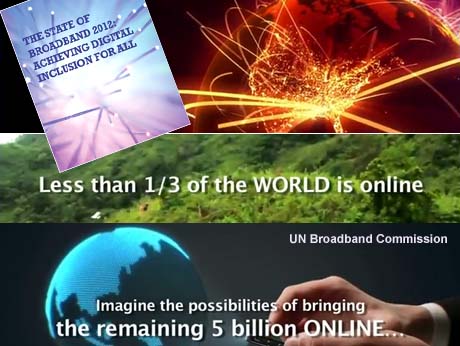
New York, 23 September, 2012 – TheBroadband Commission for Digital Development has released its first-ever country-by-country snapshot of the state of broadband deployment worldwide.
The State of Broadband 2012: Achieving Digital Inclusion for All report evaluates the roll-out of broadband around the world and tracks progress towards achieving the four advocacy targets set by the Commission in 2011 for boosting broadband affordability and uptake. It provides country rankings across up to 177 economies on economic impact, penetration, national broadband policy, and connecting people and dwellings.
India ranks at the bottom half of the global ranking and is outdone by neighbours like Sri Lanka and Bhutan in internet penetration.
In fixed broadband, India ranks 112 out of 176 nations with 1 broadband connection per 100 inhabitants. Leichtenstein is no 1 71.6 connections per 100; ( US #18)28, UK(#18) 32,China (#53) 11.6, Srilanka ( # 107) 1.7 Bhutan (#106) 1.8) Pakistan (#126) 0.4, Nepal (#127) 0.3, Bangla Desh ( # 149) less than 1.
In mobile broadband, India ranks 106 with 1.9 connections per 100 inhabitants. Singapore is the global no. 1 with 110.9 cponnections per 100, UK (#9) 62.3, US (#8) 65.5, Sri Lanka ( (#102) 2.3, Pakistan (#128) 0.3, Bhutan ( #117) 1.0, Nepal (#135) and Bangla Desh ( #155) less than 1.
The report was released at the sixth meeting of the Commission, which was held on September 23, 2012, in New York to coincide with the 67th session of the UN General Assembly.UN Secretary-General Ban Ki-moon, called broadband a “transformative technology that has the potential to spark advances across all three pillars of sustainable development: economic prosperity, social inclusion and environmental sustainability.”
The report reveals that while household Internet access has seen strong growth over the past year and is on track to achieve the Commission’s target for Connecting Homes to Broadband, individual Internet use continues to lag behind. ITU analysts believe that mobile broadband could prove the platform for achieving the boost needed to get progress back on track – at end 2011, there were already almost twice as many mobile broadband subscriptions as fixed broadband connections.
“Broadband networks and services are transforming our way of life. The Broadband Commission is committed to ensuring that the benefits of broadband are available to all”, said ITU Secretary-General Dr Hamadoun I. Touré.
The report notes a strong linguistic shift now taking place online. If current growth rates continue, it says, the number of Internet users accessing the Internet predominantly in Chinese will overtake English language users by 2015.
It goes on to outline a variety of ways in which broadband is improving the lives of people around the world, in m-health, distance education and m-learning, via m-payment systems, and in improving the lives of women, promoting innovation and fostering the acquisition of new skills. It also reinforces a clear need for policy leadership to facilitate the deployment of broadband around the world. Today, some 119 countries now have a national broadband plan or policy in place.
India specific analysis:
Mobile broadband can generate a $71B incremental increase over the period from 2014 to 2020. The benefit from broadcasting would be just over one tenth of the mobile dividend - $3.3B. Therefore, allocation to mobile would generate an additional benefit of $68.1B, or $43.8B in net present value. Most of this, around 83%, will come from increased productivity across all sectors.( quoting GSMA; Boston Consulting Group 2010).
An increase in broadband penetration of 1% will contribute INR 162 bn, or 0.11% to Indian GDP in 2015 (quotingGSMA; Analysys Mason )
Broadband has generated nearly 9 million jobs in direct and indirect ways. This result becomes more important taking into consideration the latest estimates provided by the Reserve Bank of India forecasting an increment of 220 million to India’s workforce by 2030. 10% increase in penetration will result in an increase of 0.3128% points in regional GDP. Impact on GDP growth for each 1% change in broadband penetration: 0.031 ( Quoting Katz et al 2012)
Link to ful lversion of the State of Broadband report : www.broadbandcommission.org/Documents/bb-annualreport2012.pdf
Do see our Video with the statistical highlights, for a few days in our Tech Video spot on the home page www.indiatechonline.com